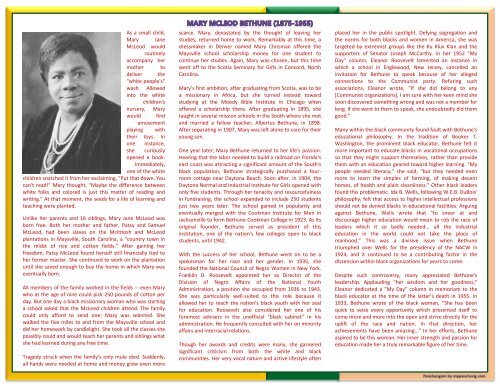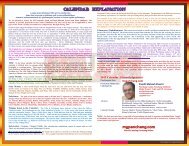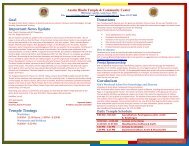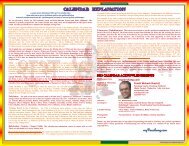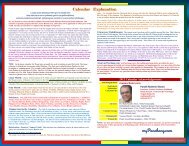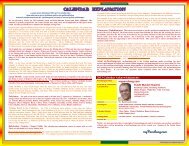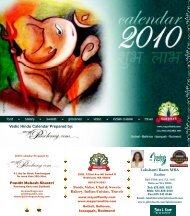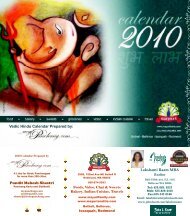Women's Education 2013 Hindu Calendar - myPanchang.com
Women's Education 2013 Hindu Calendar - myPanchang.com
Women's Education 2013 Hindu Calendar - myPanchang.com
- No tags were found...
You also want an ePaper? Increase the reach of your titles
YUMPU automatically turns print PDFs into web optimized ePapers that Google loves.
As a small child,Mary JaneMcLeod wouldroutinelyac<strong>com</strong>pany hermother todeliver the"white people's"wash. Allowedinto the whitechildren'snursery, Marywould findamusementplaying withtheir toys. Inone instance,she curiouslyopened a book.Immediately,one of the whitechildren snatched it from her exclaiming, "Put that down. Youcan't read!" Mary thought, "Maybe the difference betweenwhite folks and colored is just this matter of reading andwriting." At that moment, the seeds for a life of learning andteaching were planted.Unlike her parents and 16 siblings, Mary Jane McLeod wasborn free. Both her mother and father, Patsy and SamuelMcLeod, had been slaves on the McIntosh and McLeodplantations in Maysville, South Carolina, a "country town inthe midst of rice and cotton fields." After gaining herfreedom, Patsy McLeod found herself still financially tied toher former master. She continued to work on the plantationuntil she saved enough to buy the home in which Mary waseventually born.All members of the family worked in the fields -- even Marywho at the age of nine could pick 250 pounds of cotton perday. But one day a black missionary woman who was startinga school asked that the McLeod children attend. The familycould only afford to send one; Mary was selected. Shewalked the five miles to and from the Maysville school anddid her homework by candlelight. She took all the classes shepossibly could and would teach her parents and siblings whatshe had learned during any free time.Tragedy struck when the family's only mule died. Suddenly,all hands were needed at home and money grew even morescarce. Mary, devastated by the thought of leaving herstudies, returned home to work. Remarkably at this time, adressmaker in Denver named Mary Chrisman offered theMaysville school scholarship money for one student tocontinue her studies. Again, Mary was chosen, but this timewent off to the Scotia Seminary for Girls in Concord, NorthCarolina.Mary's first ambition, after graduating from Scotia, was to bea missionary in Africa, but she turned instead towardstudying at the Moody Bible Institute in Chicago whenoffered a scholarship there. After graduating in 1895, shetaught in several mission schools in the South where she metand married a fellow teacher, Albertus Bethune, in 1898.After separating in 1907, Mary was left alone to care for theiryoung son.One year later, Mary Bethune returned to her life's passion.Hearing that the labor needed to build a railroad on Florida'seast coast was attracting a significant amount of the South'sblack population, Bethune strategically purchased a fourroomcottage near Daytona Beach. Soon after, in 1904, theDaytona Normal and Industrial Institute for Girls opened withonly five students. Through her tenacity and resourcefulnessin fundraising, the school expanded to include 250 studentsjust two years later. The school gained in popularity andeventually merged with the Cookman Institute for Men inJacksonville to form Bethune-Cookman College in 1923. As itsoriginal founder, Bethune served as president of thisinstitution, one of the nation's few colleges open to blackstudents, until 1942.With the success of her school, Bethune went on to be aspokesman for her race and her gender. In 1935, shefounded the National Council of Negro Women in New York.Franklin D. Roosevelt appointed her as Director of theDivision of Negro Affairs of the National YouthAdministration, a position she occupied from 1936 to 1943.She was particularly well-suited to this role because itallowed her to reach the nation's black youth with her zealfor education. Roosevelt also considered her one of hisforemost advisers in the unofficial "black cabinet" in hisadministration. He frequently consulted with her on minorityaffairs and interracial relations.Though her awards and credits were many, she garneredsignificant criticism from both the white and black<strong>com</strong>munities. Her very vocal nature and active lifestyle oftenplaced her in the public spotlight. Defying segregation andthe norms for both blacks and women in America, she wastargeted by extremist groups like the Ku Klux Klan and thesupporters of Senator Joseph McCarthy. In her 1952 "MyDay" column, Eleanor Roosevelt lamented an instance inwhich a school in Englewood, New Jersey, cancelled aninvitation for Bethune to speak because of her allegedconnections to the Communist party. Refuting suchassociations, Eleanor wrote, "If she did belong to any[Communist organizations], I am sure with her keen mind shesoon discovered something wrong and was not a member forlong. If she went to them to speak, she undoubtedly did themgood."Many within the black <strong>com</strong>munity found fault with Bethune'seducational philosophy. In the tradition of Booker T.Washington, the prominent black educator, Bethune felt itmore important to educate blacks in vocational occupationsso that they might support themselves, rather than providethem with an education geared toward higher learning. "Mypeople needed literacy," she said, "but they needed evenmore to learn the simples of farming, of making decenthomes, of health and plain cleanliness." Other black leadersfound this problematic. Ida B. Wells, following W.E.B. DuBois'philosophy, felt that access to higher intellectual professionsshould not be denied blacks in educational facilities. Arguingagainst Bethune, Wells wrote that "to sneer at anddiscourage higher education would mean to rob the race ofleaders which it so badly needed... all the industrialeducation in the world could not take the place ofmanhood." This was a divisive issue when Bethunetriumphed over Wells for the presidency of the NACW in1924, and it continued to be a contributing factor in thedissension within black organizations for years to <strong>com</strong>e.Despite such controversy, many appreciated Bethune'sleadership. Applauding "her wisdom and her goodness,"Eleanor dedicated a "My Day" column in memoriam to theblack educator at the time of the latter's death in 1955. In1933, Bethune wrote of the black woman, "She has beenquick to seize every opportunity which presented itself to<strong>com</strong>e more and more into the open and strive directly for theuplift of the race and nation. In that direction, herachievements have been amazing..." In her efforts, Bethuneaspired to be this woman. Her inner strength and passion foreducation made her a truly remarkable figure of her time.


